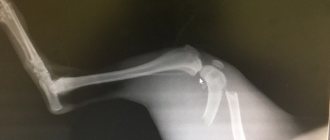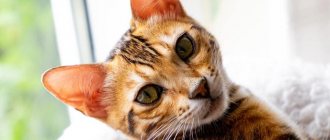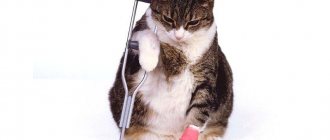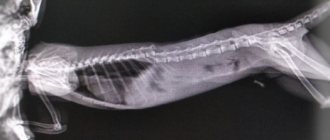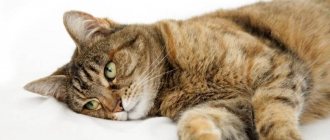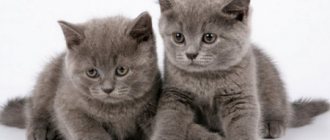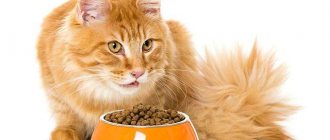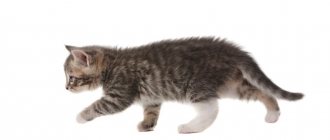Diarrhea in kittens can be a symptom of an infectious disease or indicate poisoning by toxic substances. An upset stomach causes rapid dehydration, which can cause your pet to die. Therefore, it is important to determine the cause of diarrhea as quickly as possible and begin treatment.
Let's find out what to do if a kitten has diarrhea, and how to cure it.
Causes of diarrhea in a kitten
Loose stools in a kitten can occur for various reasons. The most common one is mistakes when preparing a diet. Due to the immaturity of the digestive system, the pet’s stomach and intestines may react to a new or poor-quality product with vomiting or diarrhea.
Severe diarrhea is accompanied by infectious diseases of viral or bacterial etiology, as well as helminthic infestations. Diarrhea often occurs due to foreign objects entering the digestive tract.
Poor nutrition
This is the most common cause of diarrhea in kittens from 1 to 5 months of age. The digestive system of young animals is very sensitive, so diarrhea often occurs due to errors in nutrition.
The disorder can be triggered by the following factors:
- change of diet, sudden transition to new food;
- consumption of low-quality or prohibited products;
- overeating – the kitten’s stomach cannot cope with a large amount of food.
Infectious and invasive diseases
In case of infectious diseases, kittens experience not only vomiting and diarrhea, but also other symptoms:
- depression, lethargy;
- discharge from the eyes;
- temperature increase;
- cough;
- wheezing;
- runny nose;
- loss of appetite or complete refusal to eat.
Diarrhea is accompanied by dangerous diseases such as salmonellosis and panleukopenia. The prognosis for the treatment of these diseases is unfavorable.
Salmonellosis
Diarrhea in a small kitten 1-2 months old, which is accompanied by mucous vomiting and fever, may indicate infection with salmonellosis. With this disease, kittens also have other symptoms - cough, purulent discharge from the nose and eyes, and bloody inclusions may be present in the stool.
In kittens, salmonellosis is often complicated by bronchopneumonia.
Plague
Diarrhea in kittens under 3 or 4 months of age may be a symptom of panleukopenia. This disease is caused by a virus that affects the bone marrow, small intestinal mucosa and lymphoid tissue. Feline distemper develops rapidly and occurs with an increase in temperature to 41 degrees, vomiting, profuse diarrhea and apathy.
About 50% of animals die within a few days of infection.
Attention! Diarrhea in a 4-month-old kitten with panleukopenia is not dangerous if its mother has previously been vaccinated against feline distemper. In this case, her descendants have antibodies to the virus in their blood, and they will recover.
Worm infestations
Helminth infections are often accompanied by alternating diarrhea and constipation. Parasites that live in the intestines secrete toxins and injure its mucous membrane. Therefore, the animal experiences disturbances in the functioning of the digestive tract.
Diarrhea in a kitten may begin immediately after taking deworming tablets. This is how the intestines try to get rid of impurities.
Foreign body
Little kittens love to play with small objects - buttons, threads, Christmas tree rain and candy wrappers. If an animal ingests any of the above, vomiting and diarrhea are the most harmless things that can happen.
If a foreign object remains in the body, it can damage the walls of the small or large intestine as it moves through the digestive tract.
Other factors (allergy, stress, poisoning, vitamin deficiency)
The causes of severe diarrhea are not always associated with intestinal dysfunction. Diarrhea in a one-month-old kitten can even be caused by stress. If the bowel disorder began immediately after weaning from the mother or transferring the animal to a new owner, most likely it is associated with anxiety.
If a kitten has diarrhea, but there are no signs of an infectious disease, the animal did not overeat, the food did not change, it is worth taking into account other factors that could cause the disorder:
- allergy;
- avitaminosis;
- diseases of the gastrointestinal tract, for example, gastroenteritis;
- poisoning with toxic substances - household chemicals, plants;
- reaction to a vaccine or medication;
- change of teeth;
- benign or malignant neoplasms.
It is almost impossible to determine the exact cause of diarrhea without an examination. Therefore, it is important to show the kitten to a doctor. The clinic will take tests, do an ultrasound, and, if necessary, an X-ray of the abdominal cavity.
The veterinarian will compare the clinical picture and research data, make a diagnosis and prescribe treatment.
Pathologies during pregnancy of a mother cat and during lactation
Some diseases of newborn kittens are associated with improper intrauterine development and flaws in feeding. To prevent them, it is necessary to strictly monitor the condition of the pregnant pet, preventing her from deteriorating.
Fading kitten syndrome
Pathology develops due to placental abruption. A kitten formed in such an afterbirth weighs 25% less than its brothers and sisters. He barely moves and drinks little. In especially severe cases, complete paralysis of the limbs is noted.
Due to dehydration and hypothermia, gradual decline and death are observed. There is no cure for this disease, so do not neglect to review your cat's diet during pregnancy.
Hypogalactia
Occurs when there is a deficiency of milk caused by poor feeding, too large an offspring or the first birth. Newborns are malnourished, so their body is quickly depleted.
To solve the problem, it is necessary to abandon breastfeeding in favor of artificial. Ready-made milk formulas sold in pet stores have similar nutritional value. After reaching 1 month, they can be replaced with complementary foods.
Toxic milk syndrome
Occurs during acute intoxication caused by damage to the mammary glands or uterus. Poisoning of newborns is accompanied by:
- bloating;
- dehydration;
- diarrhea;
- refusal to feed;
- plaintive meow;
- increased temperature (observed during blood poisoning).
With these symptoms, as with hypogalactia, you should switch to artificial nutrition and consult a veterinarian. He will select medications for symptomatic therapy, and in especially severe cases, prescribe antibiotics.
How can the color of stool change during diarrhea?
Information about the color of stool and its structure will help the doctor when making a diagnosis. Types of diarrhea:
- Watery stools of normal color occur with a sudden change in diet, and also occur due to stress. If bowel movements occur 2-3 times, there is no reason to worry.
- Yellow stool indicates that food is poorly digested. Orange color of feces indicates problems with the liver or gall bladder. If yellow diarrhea occurs in a kitten not for the first time, it is advisable to diagnose the internal organs.
- Green liquid feces are a sign of dysbiosis and putrefactive processes in the intestines.
- Black diarrhea indicates internal bleeding in the upper digestive tract.
- White diarrhea is a sign of gallbladder dysfunction. Discolored stool indicates that little bile is being produced.
- Diarrhea with mucus and blood. A large amount of mucus in feces occurs with helminthiasis. Bloody inclusions in the stool appear due to inflammation of the intestinal mucosa, as well as due to damage to its walls by a foreign body. Bacterial and viral infections also cause bloody diarrhea.
Procedures for a 2 month old cat
The sooner you start taking action, the better. After the first days of adaptation, start with these basic procedures:
- Physical stimulation : It is important to encourage your kitten to be physically active. This will promote muscle development and help avoid excess weight. The playtime you share with your two-month-old cat is part of the physical stimulation, but try to offer him places and toys that will allow him to entertain himself.
- Mental stimulation : Just as important as the previous one, you get this by enriching your space with cat structures, tunnels, or a few simple cardboard boxes. Intelligence toys are also very useful.
- Brushing and hygiene : Although your two-month-old cat will take care of her own grooming, it doesn't hurt to give her a hand. In addition, if he gets used to your caresses and brushes his hair, your bond will strengthen.
- Play together for fun : Although you may not believe it, cats are very social and love playing with people. We recommend playing with it a little every day.
- Love is the main thing . In addition to the above steps, your kitten will need your love and affection. You will be seen as if you are offering it, interact with you. He will even want to cuddle up to you, lick you, or bite you... all signs of affection.
As you can see, you need to make some changes and put certain routines into practice with a 2 month old cat. However, all the effort is worth it. Having a cat at home is beneficial for the whole family.
First aid
To stop diarrhea in a kitten, you need to eliminate its cause. Treatment at home is aimed primarily at preventing dehydration, as well as alleviating the pet’s condition.
The first thing to do if a small kitten has diarrhea is to put it on a fasting diet for 12 hours. The drinking bowl should be washed and filled with fresh water. With diarrhea, the body quickly loses fluid, so it is important to replenish its reserves.
If the kitten does not approach the drinking bowl, it must be soldered from a syringe without a needle with Regidron solution.
Attention! It is important to limit the contact of a sick animal with other pets to prevent them from becoming infected.
After some time there should be improvement. The normalization of the kitten's condition is indicated by increasing intervals between acts of defecation. Gradually, the liquid stool will acquire a mushy consistency. Then you can give the animal some food.
Veterinarians recommend feeding a kitten with diarrhea only therapeutic and prophylactic food, because it does not irritate the intestinal mucosa and is easily digested.
If the diarrhea does not go away, you can give the kitten one of the medications that help remove toxins from the body and normalize the intestinal microflora:
- Smecta. Dilute half the contents of the sachet in 100 ml of water. Give 3-5 ml 3-4 times a day.
- Enterosgel. Squeeze half a centimeter of gel out of the tube and dilute it in 20 ml of water. Give 3-5 ml three times a day.
- Bifidumbacterin. The contents of one bottle are diluted in 5 ml of water and given to the kitten to drink 2 times a day.
Attention! If home therapy does not produce results, and diarrhea continues for more than 1.5-2 days, a doctor should treat the kitten’s diarrhea. Perhaps diarrhea is one of the symptoms of an infectious disease.
What not to do
They often write on forums that Loperamide will help stop diarrhea when the kitten is squealing. However, in most cases this medicine can only do harm. This drug slows down peristalsis and reduces the frequency of the urge to defecate.
Diarrhea may indeed stop, but all toxins will remain in the intestines and will be absorbed into the blood. Due to severe intoxication, the kitten will feel even worse.
Do not give antibiotics to a sick pet without the advice of a veterinarian. Also, you should not give your animal vodka in the hope that it will kill the pathogenic microorganisms that caused the diarrhea. Alcohol can greatly aggravate a kitten's condition.
Consequences
Cats love to climb tall trees, fearlessly climb onto roofs, and sometimes they have the desire to jump out of a window, and not from the first, but preferably the third or sixth floor. The animal deftly lands on its paws and never falls on its back. However, sometimes such falls end in disaster for the pet. If a cat crashes and severely damages its limbs, spine or internal organs, there is little chance of a successful recovery. Therefore, it is important for the owner to monitor the safety of the pet, especially if he lives in a high-rise building on the top floors.
Fractures and bruises
A cat falling from a height is rarely accompanied by any consequences. The animal's body is designed to jump from incredible heights.
If cats jump from a window 3-5 stories high, and the surface on which they land is not concrete, the danger of breaking is minimal. But when the cat falls out from 6-7 floors, the likelihood of getting injured or bruised increases. If a cat falls from a window located at a high altitude, a fracture of the spine and limbs may occur. The symptoms in this case are:
- complete immobility;
- unnatural position of the back limbs;
- severe pain shock, lack of response to stimuli.
Return to contents
Bleeding and bruising of internal organs
If a cat falls out of a window from the 8th-9th floor, there is a high probability of damage to the animal’s organs. A characteristic sign of internal bruises and tissue rupture is bleeding from the nose or anus, a sharp increase in the volume of the abdomen, severe pain on palpation. To prevent the injured cat from dying, it is necessary to urgently take it to the hospital, because in such situations it will not be possible to help the animal on your own.
Brain concussion
A fall from a height can result in damage to the skull and a concussion. In this case, the animals experience severe vomiting, breathing problems, they do not understand where they are, do not recognize the owner, and they sway greatly when walking. Other symptoms of brain damage include:
- hematomas, bruises and bruises in the head and neck;
- redness or pallor of the mucous membrane;
- different pupil sizes;
- rapid movement of the eyeballs;
- lack of response to light stimulus;
- convulsions;
- increase in heart rate.
Return to contents
In what cases is it necessary to urgently consult a doctor?
It is necessary to go to the clinic if the animal received sorbents and was fasting, but the diarrhea does not go away. Other reasons to contact your veterinarian immediately:
- heat;
- vomit;
- depression, lethargy;
- symptoms of dehydration - dry mouth, pale gums, stringy saliva, sunken eyes;
- the presence of blood in the stool.
How to tell if your cat is lactose intolerant
The main symptoms of lactase deficiency in cats are painful bloating, diarrhea and vomiting. Most often, unpleasant symptoms appear 8-12 hours after the animal consumes milk.
The following mechanism works in the cat’s body: she drinks milk, but lactose is not broken down by lactase and passes through the small intestine undigested. Next, milk sugar attracts water and ends up in the large intestine, where bacteria try to process it. At this time, carbon dioxide, hydrogen and other substances that cause fermentation are released.
Treatment principle
The treatment regimen depends on the diagnosis. If salmonellosis is suspected, antibiotics are prescribed - Enteroseptol, Tetracycline, Fthalazol. The dosage is determined taking into account the kitten’s body weight.
The veterinarian may recommend giving your pet a weak solution of potassium permanganate. If there are obvious signs of dehydration, the animal is injected into a vein with a saline solution containing electrolytes.
If panleukopenia is suspected, diarrhea is treated symptomatically. The kitten is prescribed vitamins, glucose injections, and immunostimulants. It is recommended to take probiotics to restore intestinal microflora.
To prevent dehydration, Dufalight is prescribed, and in severe cases, Voluven in the form of injections is indicated.
In case of poisoning by poor-quality food, veterinarians use sorbents. Along with them, probiotics are prescribed. Feeding should be done in small portions so as not to put a lot of stress on the stomach and intestines. Drinking plenty of fluids is recommended.
Diarrhea, which is caused by helminthic infestation, is treated with anthelmintic drugs.
If a foreign body is detected in the intestines or stomach, surgical intervention is indicated.
Why are cats born blind?
Many purring owners are interested in two questions: after how many days do kittens open their eyes, and why fluffies are born blind. In fact, kittens are not blind at all - they just have their eyelids closed too tightly.
Why is this planned? Even if you see a cute purring animal in front of you, remember that cats are predators. Nature came up with everything as accurately as possible. The fact is that a cat's pregnancy proceeds too quickly. This is intended so that the animal can hunt normally, chasing prey and running away from ill-wishers. If pregnancy in cats lasted longer, it is unlikely that they would be able to search for food normally.
Since kittens are born at a short period of time, they are not yet fully developed organisms. Vision continues to develop after the furballs are born.
Disease prevention
The owner must do everything that depends on him so that diarrhea bypasses the pet:
- When feeding your animal with ready-made kitten food, it is better to give preference to dry food, as it does not spoil.
- Keep the bowl and drinking bowl clean, wash them regularly and scald them with boiling water.
- Timely vaccination against infectious diseases.
- Give anthelmintics to prevent helminthiasis.
- Do not leave small objects on the floor or table that the kitten could swallow.
- Introduce new foods gradually.
- Feed the kitten in moderation, making sure that it does not overeat.
- Limit your pet's contact with street animals that can be carriers of dangerous infections.
Diarrhea is a rather dangerous phenomenon when it comes to a small kitten. At the first symptoms, it is better to immediately show your pet to a doctor. You can’t hesitate - your pet can die in a matter of days from dehydration and intoxication.
